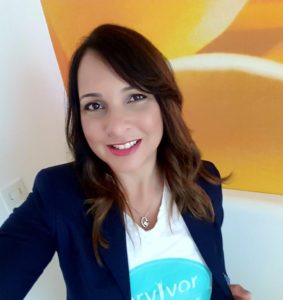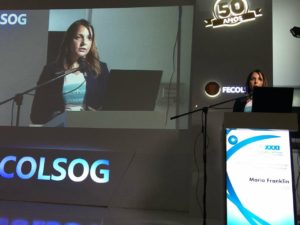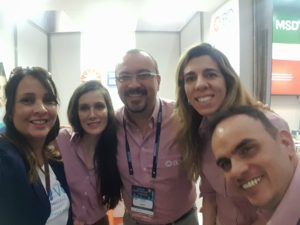Sometime in 1999, while I was battling cervical cancer, a young doctor told me “you need to learn as much as you can about your cancer.” I didn’t know there was anything to learn. It was cancer, after all, but I never forgot his words and started searching for information. Cervical cancer was not something I had heard of before and HPV was not even mentioned in my diagnosis, as I was never tested for it. Once I started learning about the link between cervical cancer and HPV and how common HPV infections were, I decided to talk about it with my friends, family, and whoever wanted to listen. Not surprisingly, I found out most of my friends and family had never heard about HPV, let alone suspect they may have come in contact with it at any point in time. That’s when I realized I needed to talk to others about HPV, this common but dangerous virus that can lead to cancer. While I was open to sharing information, I always felt like a lonely voice that would never have any significant impact. I would’ve never imagined that one day, I would be sharing my story in Colombia.
Cervivor:
I first connected with Tamika online in 2009, but it wasn’t until 2015 that I met her in person after she insisted I attended my very first Cervivor School; she assured me I needed to do it. I really needed Cervivor. The feeling of being among other women who shared, not only my diagnosis, but a commitment to eradicate cervical cancer, cannot be described. I left informed, prepared, and empowered to share my story, I knew my experience as a survivor would move others to action. I was part of a strong community of advocates. I was convinced that our stories and our voices could save lives.
Over the years I’ve shared my story online, one on one, and at various events, and while I knew I was doing my part to eradicate this cancer, it never feels like I’m doing enough. You see, as a woman of Latino roots, I feel a burden for my Latino community; after all, we have the highest rates of cervical cancer, and are #2 in death rates due to this disease. There’s certainly more work to do and I, along with the other Latino Cervivor Ambassadors carry this desire to impact the Latino community with us. Recently, I had an opportunity to do just that.
Cervivor was recently contacted by a company, that, after hearing one of our Cervivor Ambassadors share her story, knew that the voices of cervical cancer survivors was a missing piece in their efforts to eliminate cervical cancer in Latin America. They wanted us to join efforts with them, knowing the impact our stories could have. I was lucky enough to be the first one to join in this effort and soon I found myself on a plane to Cartagena, Colombia.
The day of my flight I was proudly wearing my Cervivor Ambassador shirt; after all, our organization, our network of cervical cancer survivors was about to leave its footprint in Latin America. Finally our stories, the stories of Cervivor were going to have an impact in the health of the women of Colombia. I was nervous and I was excited, I couldn’t wait to get there.
I shared my story at a medical conference; the room was reserved to host 200 individuals, the doors had to be closed after counting close to 300. Yes, close to 300 Colombian gynecologists, obstetricians, and other health professionals came in to hear the latest on HPV testing and the story of a cervical cancer survivor. Afterwards, some stopped by to ask questions and talk about the challenges they face with their patients, wanting to know what could be done differently to help their patients. What an incredible opportunity I’ve been given to be the patient voice!
During this trip I was able to meet with some of the lead doctors that are developing and implementing HPV screening and follow up guidelines in efforts to reduce the rates of cervical cancer cases and cervical cancer related deaths in this beautiful country. They shared with me the trouble doctors are having communicating with their patients. When women are told they have an HPV infection, shame takes over them, even though they’ve done nothing wrong; some worry about what to tell their husbands or relatives, and the shame they feel is at times is so much that they don’t return for follow up. For others, the problem is accessing care as they live in remote areas, or overcoming cultural and/or religious barriers… and thus the cancer rates continues to rise.
The good Colombian doctors are committed to helping the women in their country and they think our stories will help these women know they are not alone, that it is okay to ask questions and follow up with their doctors, that they did nothing wrong, they did nothing to deserve cancer. It is believed that our Cervivor stories will make a difference and get these women to go to their doctors for their Pap and HPV tests and the needed follow up. The doctors want their patients to have Cervivor contact information and we are ready to welcome them to our supportive community. It was truly an honor to be part of these conversations.
I felt right at home in Colombia; the warm weather, the colorful buildings, the sound of the ocean, the tropical fruits I love so much… but what I loved the most, was the warm and welcoming Colombian people. I met so many people who are committed to improve the health of Colombian women and I can’t wait to go back to follow up on our work there.
As I was flying back home, I kept thinking about my doctor’s words 19 years ago and about my first Cervivor School, as both of these things had such a big impact in my life. He may never know it but Dr. Rivera-Gautier planted a seed that later Cervivor would feed to make me an advocate. A recent story on ethnic and racial disparities in cervical cancer stated “globally, a woman dies every 2 minutes from this entirely preventable disease”[1]; I am proud to be part of an organization that is working hard to change that.
[1] Ethnic and racial disparities in cervical cancer: lessons from a modelling study of cervical cancer prevention
Ginsburg, Ophira et al.
The Lancet Public Health , Volume 3 , Issue 1 , e8 – e9
Read Maria’s Cervivor Story here.